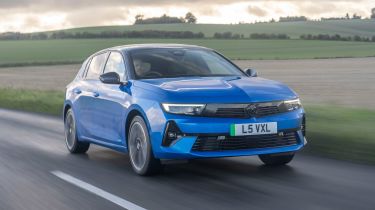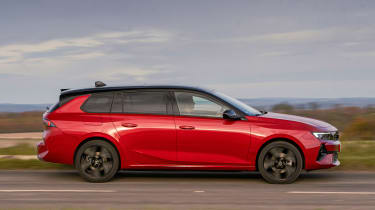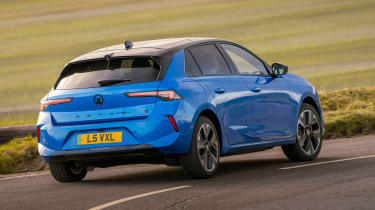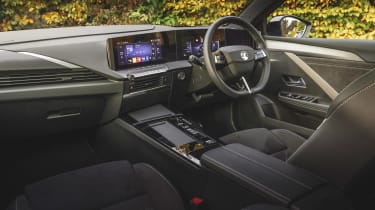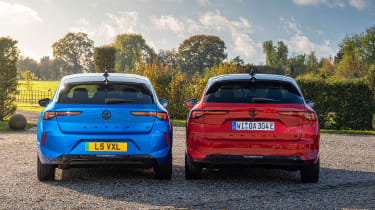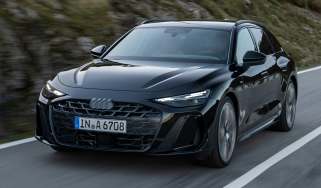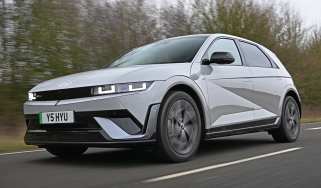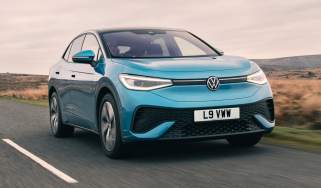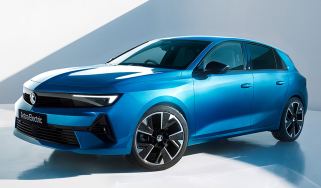Vauxhall Astra Electric review - household name with an EV twist
“The first-ever Vauxhall Astra Electric has arrived, and it’s pitched squarely at helping drivers of petrol and diesel models make a fuss-free switch”
Pros
- Familiar design
- Decent range
- Well equipped
Cons
- Reduced boot size
- Cheap-looking finishes
- Pricey
Verdict - Is the Vauxhall Astra Electric a good car?
In the world of EVs, there are start-up brands, clean-sheet designs from traditional makers and electric models based on combustion-engined cars. The Vauxhall Astra Electric is from the latter camp, so while it isn’t as radical as something like a Tesla Model 3 or even a Renault Megane E-Tech, it will be instantly familiar to buyers. In fact, if one drives past, you’ll be hard-pressed to tell it apart from the petrol version if you don’t spot the green flashes on its number plates.
While this should appeal to buyers making the switch to an EV, it also holds the Astra Electric back in some regards; its boot has been cut in size, and there’s a hump running through the cabin – unlike most ground-up EVs with a flat floor. It’s also expensive, which could be the biggest sticking point, but we suspect leasing deals and lower running costs will make this less of an issue than it first appears. The Sports Tourer is one of very few electric estates on the market, giving it a unique selling point – the hatchback, however, somewhat fails to stand out in any specific area.
Vauxhall Astra Electric models, specs and alternatives
While some EV models such as the Tesla Model 3 have gained a reputation for offering different styling, performance and gadgets from the norm, the Vauxhall Astra Electric feels rather conservative by comparison. It’s pitched firmly as a part of the Astra range and just happens to be electric, and most onlookers would struggle to tell it apart from the petrol or plug-in hybrid versions. However, this might be offputting for those who like the distinctive looks and features of rivals like the Renault Megane E-Tech, Volkswagen ID.3, Tesla Model 3 and Cupra Born.
 The 10 best electric cars in 2026
The 10 best electric cars in 2026
The Astra Electric was launched in GS and Ultimate trim levels, but Vauxhall later introduced the entry-level Design for the EV in late 2023, which was originally only available on petrol models. It’s a welcome addition that will make the Astra Electric marginally more accessible, with a lower £38,000 starting price, roughly on a par with mainstream rivals, but roughly £10,000 more than the bargain MG4.
More reviews
You’ll need to pick the Vauxhall Astra Electric Sports Tourer estate if you want to stand out in the EV crowd, because it’s one of the very few EV estates on the market. Only the MG5 and the Peugeot E-308 currently fulfil the same brief, and the E-308 is closely related to the Vauxhall anyway.
The Astra Electric is clearly intended to offer Astra buyers a logical alternative without kicking over the apple cart, and that goes for its performance, too. With a single electric motor under its bonnet, the Astra Electric has front-wheel drive and 154bhp, so it gathers pace smoothly and hits 62mph from rest in just over nine seconds; reasonable performance for a family hatchback, but nothing that will pin you back in your seat.
|
Trim levels |
Power options |
|
|
The Astra Electric does feel nippy at lower speeds, though, aided by its lack of gear changes and near-instant power delivery. It’s also respectably light on its feet for an EV, and handles well. This comes at the cost of some comfort at lower speeds, where the suspension feels a bit firm, but the Vauxhall still proves comfortable most of the time.
Some of the interior materials aren’t as premium as they should be, and there’s the issue of the Astra’s everyday image for a car costing around £40,000. With the new Design trim you get 18-inch wheels, a 10-inch touchscreen with voice-activated sat nav and a 10-inch digital gauge cluster among other features, so it’s at least fairly well-equipped.
Vauxhall Astra Electric alternatives
The Astra Electric might be a good all-rounder, but it’s not lacking rivals, with the MG4 far cheaper, and the similarly priced Megane E-Tech and Cupra Born offering a more stylish, sporty feel.
Electric estates
The fledgling electric estate class has less competitors, but the MG5 EV is much-improved by its latest facelift and offers good value, while the Peugeot E-308 SW is more dramatically styled and upmarket than the Vauxhall.
Range, charging & running costs
There’s only one motor and battery combination on offer for the Astra Electric, and it’s set to become ubiquitous in EV models under the Stellantis umbrella, such as the Peugeot E-308. At its heart sits a 54kWh battery pack, that’s slightly smaller than the 60kWh pack found in the Renault Megane E-Tech. This gives the Astra Electric a shorter range of 258 miles, next to 280 miles for the Renault, but it does beat the Peugeot E-308 by 10 miles. Range for the Astra Sports Tourer estate is 256 miles, so there’s little penalty for the elongated boot.
Following our testing, we think a range of over 200 miles should be easily possible in real-world driving, and the estimated range figure didn’t seem to be hit as hard by motorway driving as some earlier EVs from Vauxhall. However, it’s a shame the Vauxhall doesn’t come with an energy-saving heat pump, because this could mean its range figure takes more of a hit in the winter months than rivals with this technology.
The Astra Electric can hit peak charging speeds of 100kW at compatible public chargers, for an optimum top-up from 20-80% in 26 minutes. The Megane E-Tech can charge at 130kW, but Renault’s quoted 15-80% time of half an hour means there’s little in it. Charging the Astra using a standard 7kW home wallbox will take around eight hours, so most drivers will be able to hop in a fully charged car every morning if they want to.
While the Astra Electric’s starting price might be hard to swallow – even if it’s on par with most rials – very few buyers are likely to pay the full price upfront, and Vauxhall is already offering 0% PCP finance deals with attractive monthlies. Running costs will also be drilled down by free VED (road tax) until 2025 and exemption from the London Congestion Charge and ULEZ. Company car drivers will also be prime customers for the Astra Electric, thanks to its super-low Benefit-in-Kind liability.
|
Model |
Battery size |
Range |
|
Vauxhall Astra Electric |
54kWh |
258 miles |
Insurance
Unfortunately, electric cars tend to come with fairly high insurance groups, and the same is the case for the Astra Electric. The Design trim sits in group 26, two places higher than the plug-in hybrid Astra. This is, however, similar to its rivals, with the Megane E-Tech sitting in groups 26 to 27.
Electric motor, drive & performance
The combustion-engined Vauxhall Astra is one of the best cars to drive in the family hatchback class, and this is generally the same with the Electric model. Taut suspension means the Vauxhall has crisp handling, and it doesn’t weigh quite so much as some other EVs, which helps it to tackle corners without feeling big and lazy.
Its firm suspension can be felt around town over rough tarmac, but even with 18-inch alloy wheels fitted, the Astra Electric remains smooth and composed enough that it should be relaxing for longer trips.
0-62mph and top speed
With a single 154bhp electric motor under its nose, Vauxhall has resisted the temptation to turn the Astra Electric into a speed demon. Instead, its acceleration figures are roughly comparable to those of the petrol or diesel hatchbacks its buyers will likely have driven for years beforehand.
The biggest difference is the lack of gear changes, and the fact power is always available – there’s no need to be at the right revs or wait for a turbocharger to get going here, but for an EV there is still a slight hesitation between hitting the accelerator and the motor responding.
When the electric motor’s grunt does arrive, the Astra Electric feels punchier than its figures suggest around town, and the performance only starts to tail off if you need to keep accelerating to motorway speeds. Competitors like the MG4 and Renault Megane E-Tech are noticeably quicker, though.
Owners can switch driving modes to alter the power and feel of the Astra Electric, and there’s also ‘B’ mode next to the gear selector. This ramps up the level of brake regeneration, which feels like taking your foot off the accelerator in a low gear, but acts to put energy back into the battery pack as the car decelerates. It won’t bring the car to a complete halt like many rivals with ‘one-pedal driving’, though, and we prefer rivals like the Hyundai Kona Electric that have paddles behind the steering wheel to adjust the level of regen as we’re driving. We also found the brakes can feel a bit clumsy at low speeds, leading to some sharper-than-intended stops in traffic.
|
Model |
Power |
0-62mph |
Top speed |
|
Vauxhall Astra Electric |
152bhp |
9.1s |
106mph |
Interior & comfort
Swing open the front door, and the Astra Electric’s interior is virtually identical to the rest of the Astra range, which is no great surprise, but some of its fit and finish are harder to forgive in higher trims costing upwards of £40,000 – a petrol version is available costing around £15,000 less, and the interior feels more in keeping with this price point.
Infotainment and navigation
Still, most of the Astra Electric’s interior is roughly on par with its EV rivals and its dual 10-inch infotainment screens are easy to use for the most part. It’s a shame so much of the home screen is dedicated to showing the heater controls, though.
There are more physical controls than you’ll find in a Volkswagen ID.3, both to jump to certain functions and to adjust the climate control, making life far easier. It also features wireless Android Auto and Apple CarPlay, for a slick connectivity experience and less clutter.
While the Vauxhall Astra Electric originally bypassed the entry-level Design trim available on petrol models when it was launched, the brand later introduced it for the EV in late 2023, lowering its new starting price to just under £38,000. While it makes the car somewhat more accessible, it’s still expensive compared to some rivals. Design trim gets 18-inch wheels, a simpler exterior without the contrasting roof colour on GS spec and above, plus the same 10-inch infotainment display and 10-inch digital dials. There’s also sat nav, voice control tech, rear parking sensors, keyless start and automatic lights and wipers, so it is at least well-equipped.
The Astra Electric GS is a step up and gets features such as a 360-degree camera, adaptive cruise control, heated front seats and a heated steering wheel.
Step up to the Ultimate trim for around £3,000 extra, and extra goodies include a head-up display, a wireless smartphone charging pad, a panoramic sunroof and a heated windscreen. There are Alcantara seats, too, giving the interior ambience a small boost.
Key features | ||
|
Design
|
GS (Design plus...)
|
Ultimate (GS plus…)
|
Practicality & boot space
There’s good news for back seat passengers, even in the hatchback, because space here is pretty much unaffected versus the petrol model, with decent headroom and legroom for two adults to sit in the back comfortably. Unlike clean-sheet EVs such as the MG4, though, there is a hump in the floor that makes life less comfortable for a middle passenger’s feet and legs.
|
Size comparison | |||
|
Model |
Length |
Width |
Height |
|
Vauxhall Astra Electric |
4,374mm |
1,860mm |
1,441mm |
|
Renault Megane E-Tech |
4,199mm |
1,860mm |
1,505mm |
|
Volkswagen ID.3 |
4,261mm |
1,809mm |
1,568mm |
|
MG4 |
4,287mm |
1,836mm |
1,504mm |
Boot space
One of the big disadvantages of fitting electric powertrains in models with combustion-engined counterparts is the difficulty of installing a large battery pack without sacrificing cargo space. Here, the Astra Electric has a boot measuring 352 litres, which is around 100 litres smaller than the petrol version. It’s still not tiny though – a Volkswagen ID.3’s boot has only 385 litres – and the MG4’s is comparable with 363 litres.
Unlike most EVs so far, the Astra Electric is also offered as an estate, giving the MG5 its first real rival, alongside the Peugeot E-308 SW that’s closely related to the Vauxhall. Pick the Astra Electric Sports Tourer and boot space increases to 516 litres, while rear legroom also improves thanks to a slightly longer wheelbase (the gap between the front and rear wheels). Fold the rear seats down and it expands to 1,553 litres, beating the MG5 by 186 litres. It’s a well-thought-out space too, with almost no loading lip, a wide and level floor, handy cargo nets at each side to secure loose items and sturdy tie-down hooks at each corner.
|
Boot space comparison | |
|
Model |
Boot space |
|
Vauxhall Astra Electric |
352/1,268 |
|
Renault Megane E-Tech |
440/1,332 |
|
Volkswagen ID.3 |
385/1,267 |
|
MG4 |
363/1,177 |
Reliability & safety
The Astra Electric takes the same underpinnings as the petrol version and adds a battery and electric motor with fewer moving parts so, in theory, we’d hope for even better reliability. This should also be the case given that this EV powertrain is used in numerous Stellantis models, so any issues would be a major setback for the brand – it will have undergone rigorous testing.
Vauxhall doesn’t have the best reputation with owners according to our latest Driver Power owner satisfaction survey, however, coming 24th out of 32 brands. Almost a quarter of buyers reported a fault within the first year, mostly with the car’s electrics, but they were happier with running costs and the price of servicing.
Safety
As you’d expect from a popular family car, the Astra Electric should also prove to be a safe car. The regular Astra was tested by Euro NCAP in 2022 and awarded four out of five stars, with scores of 80% and 82%, respectively, for adult and child occupant safety.
Ultimate trim versions also gain Vauxhall’s ‘Intelli-drive 2.0’ technology, which adds a suite of extra safety technology. For a start, there’s semi-autonomous lane changing, while rear sensors can also help the driver avoid reversing into traffic, such as when backing out of a parking space. Intelligent speed adaption can also recognise speed limits and even weather conditions, and prompt the driver to adjust their speed via messages that pop up in the instrument panel.
Which Is Best?
Cheapest
- Name115kW Griffin [Tech Pack] 54kWh 5dr Auto
- Gearbox typeAuto
- RRP£34,995
Most Economical
- Name115kW GS 54kWh 5dr Auto
- Gearbox typeAuto
- RRP£37,240
Fastest
- Name115kW Griffin [Tech Pack] 54kWh 5dr Auto
- Gearbox typeAuto
- RRP£34,995
